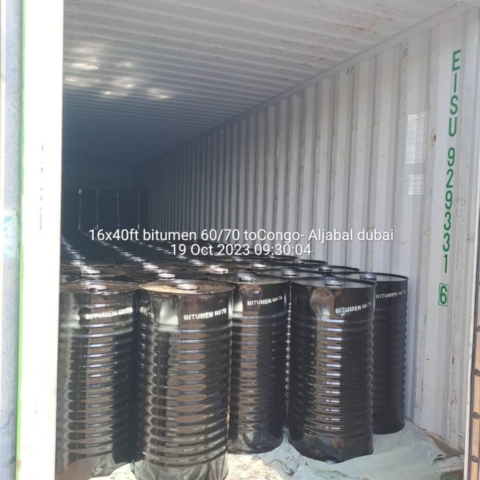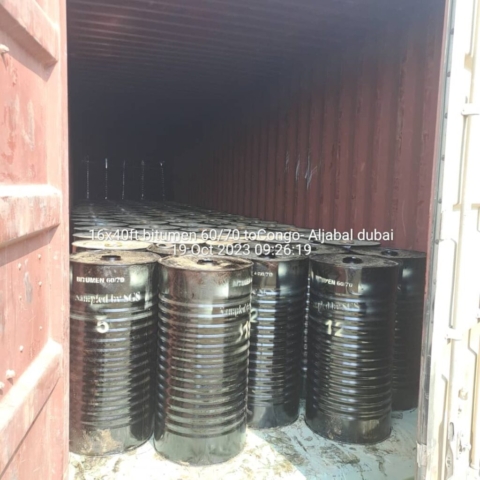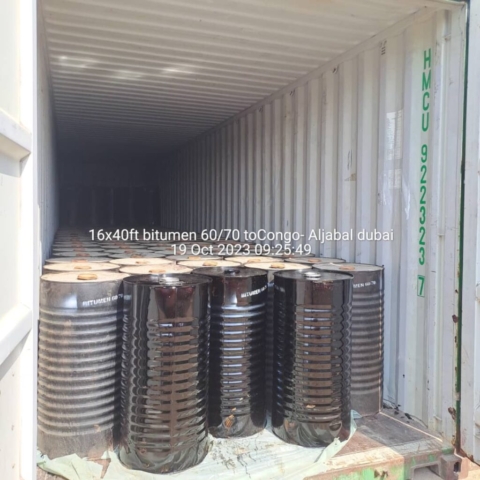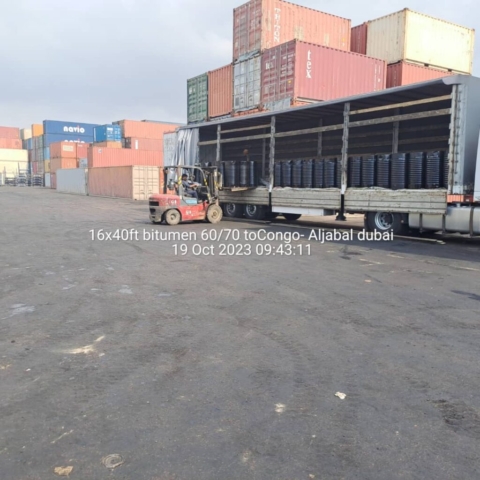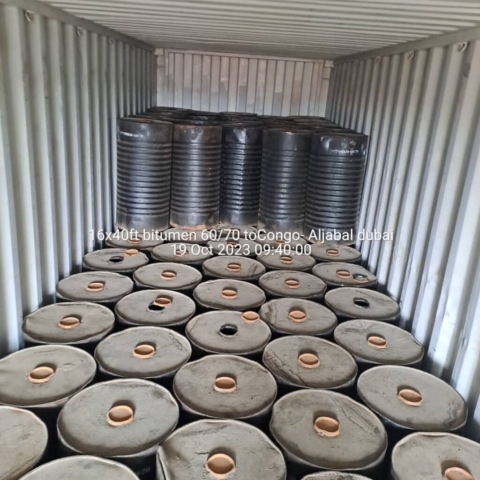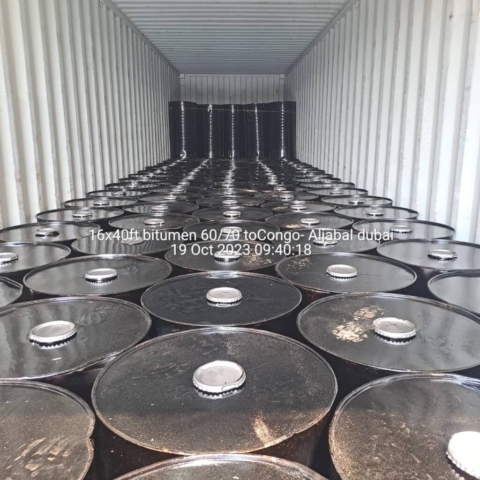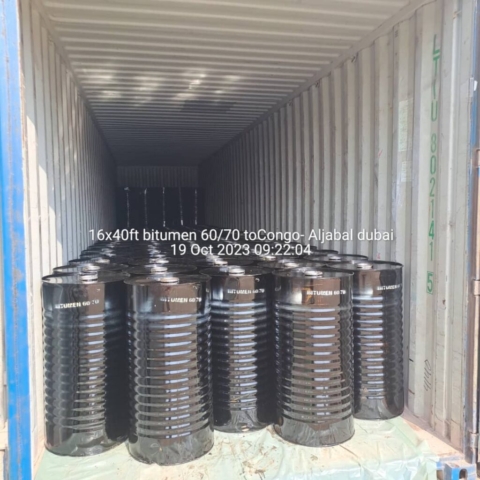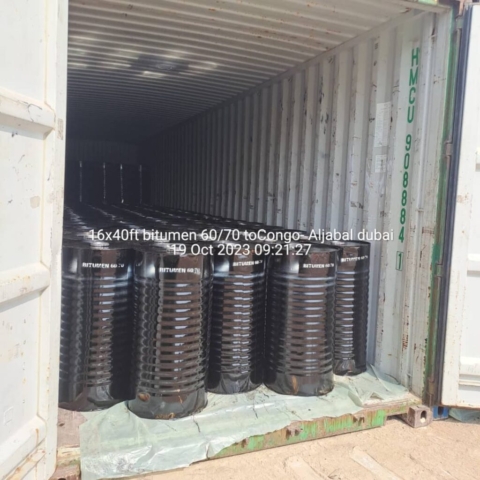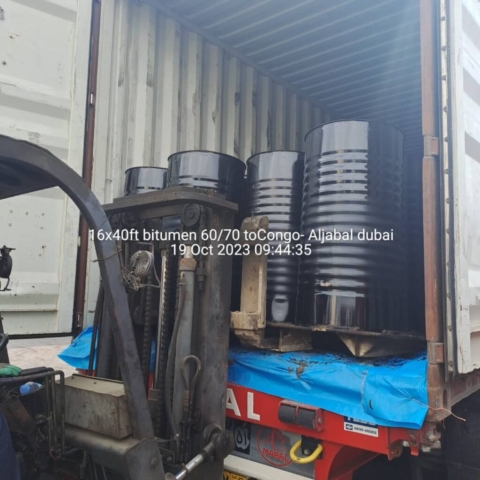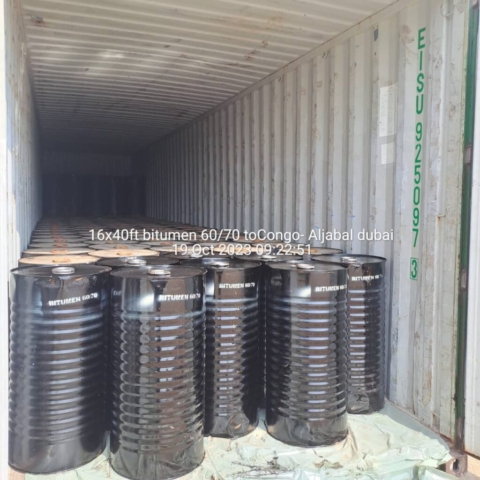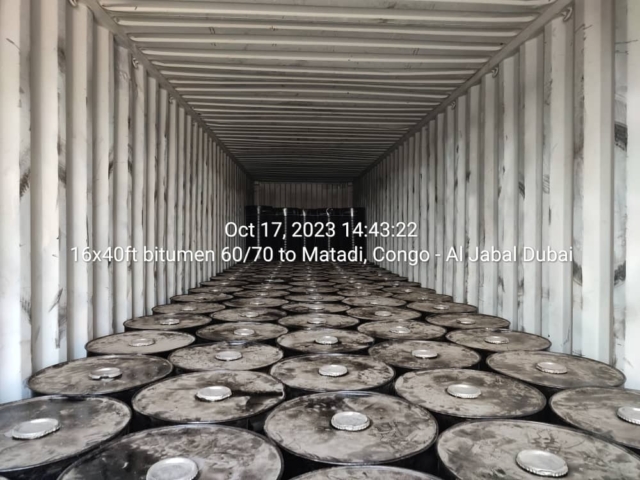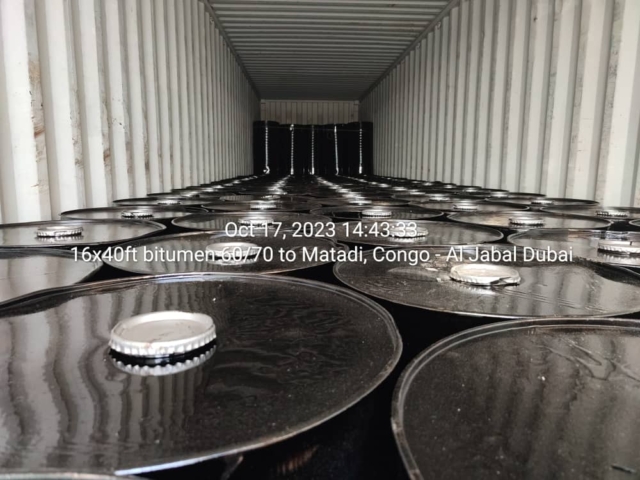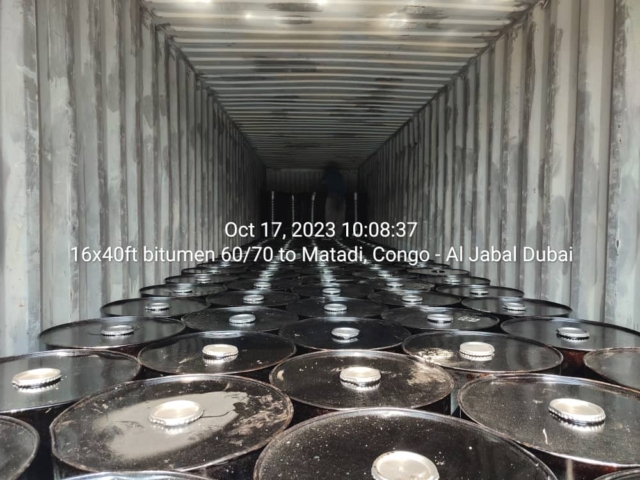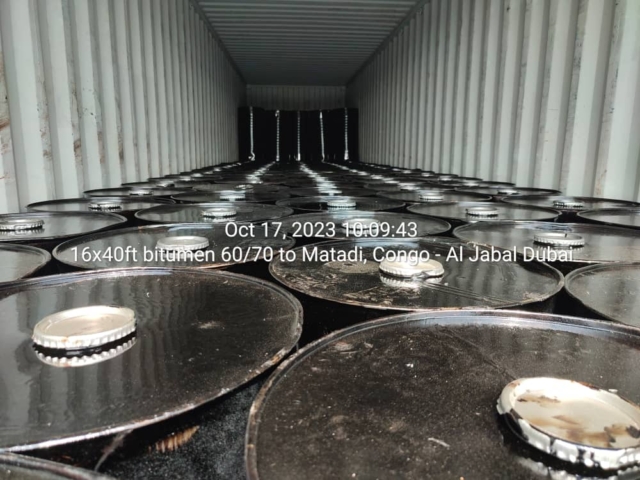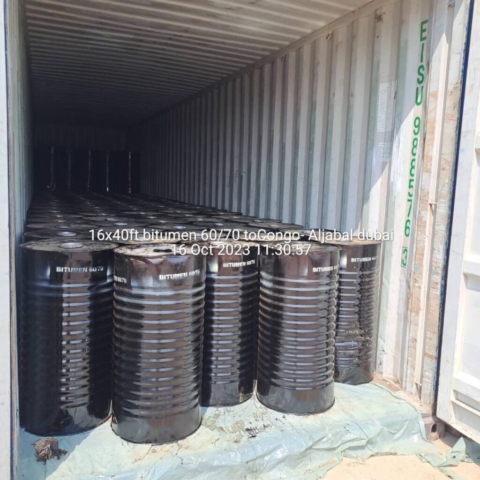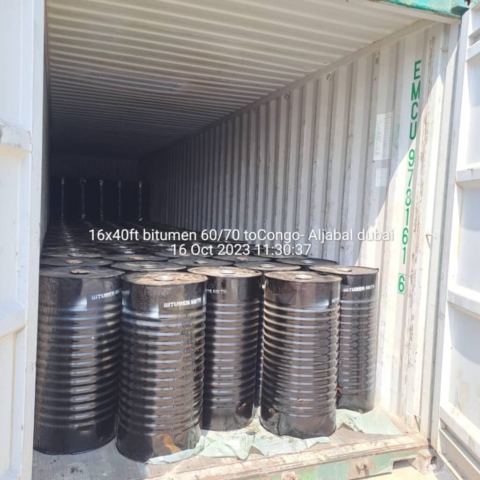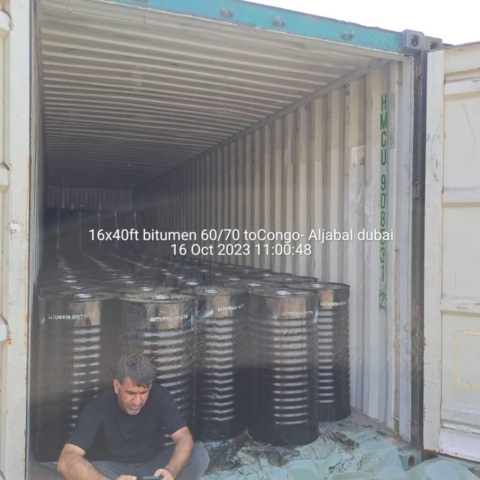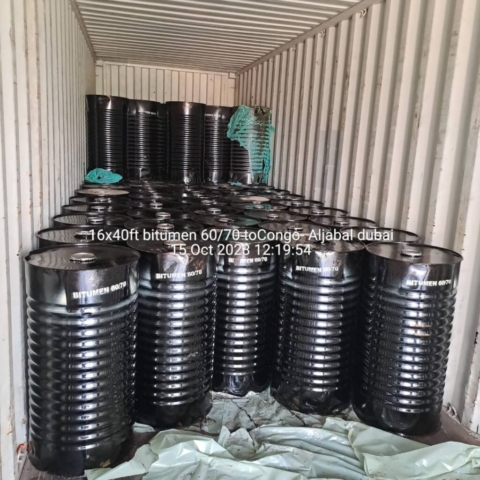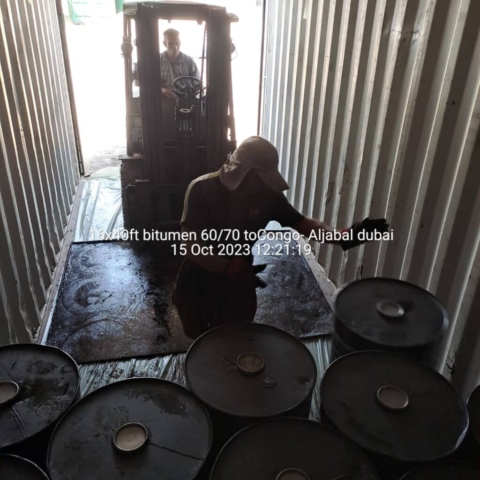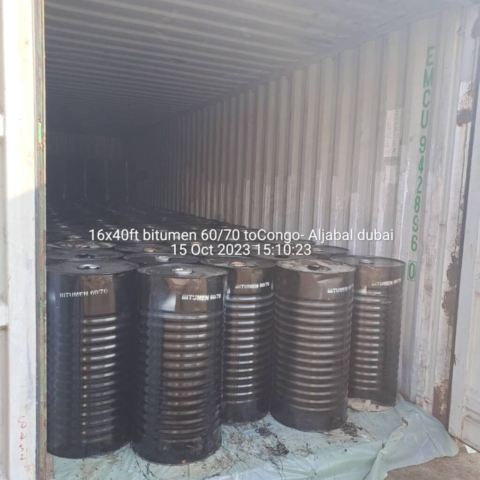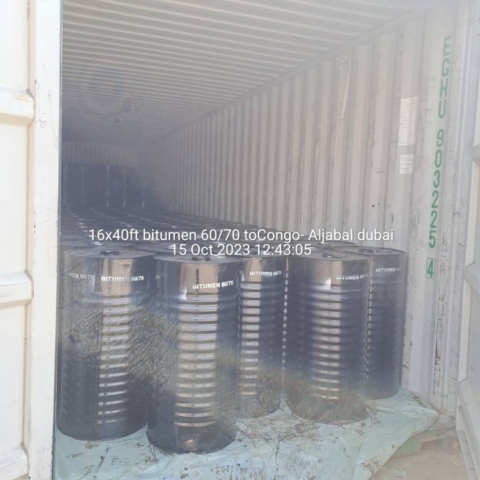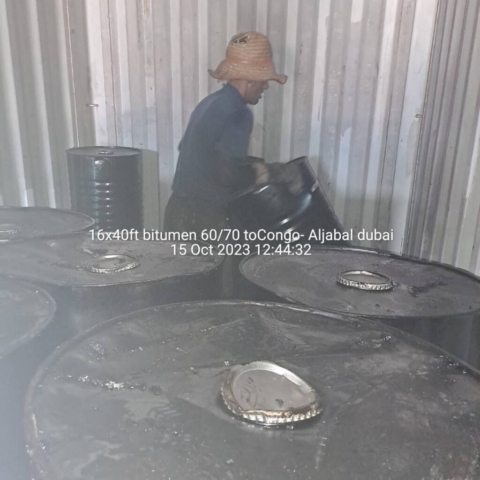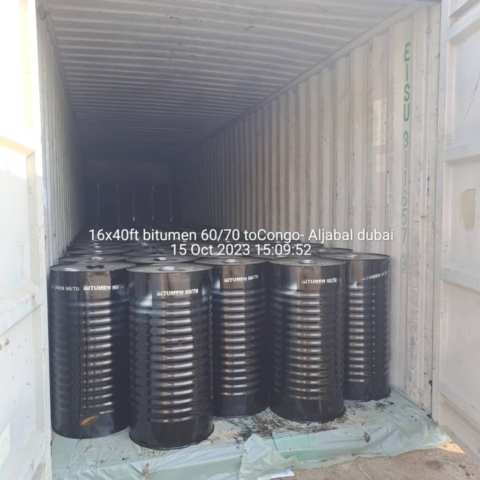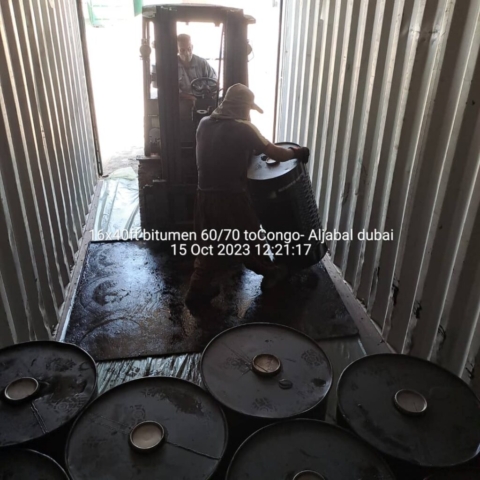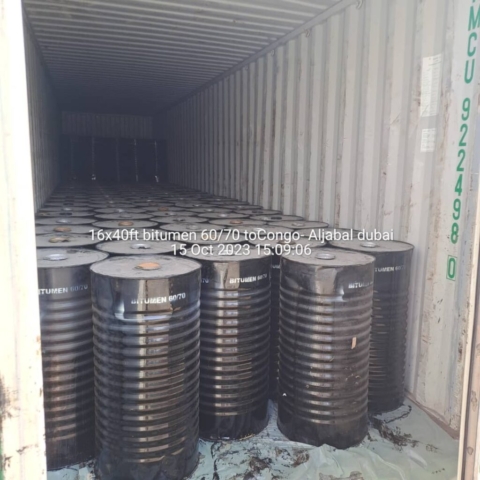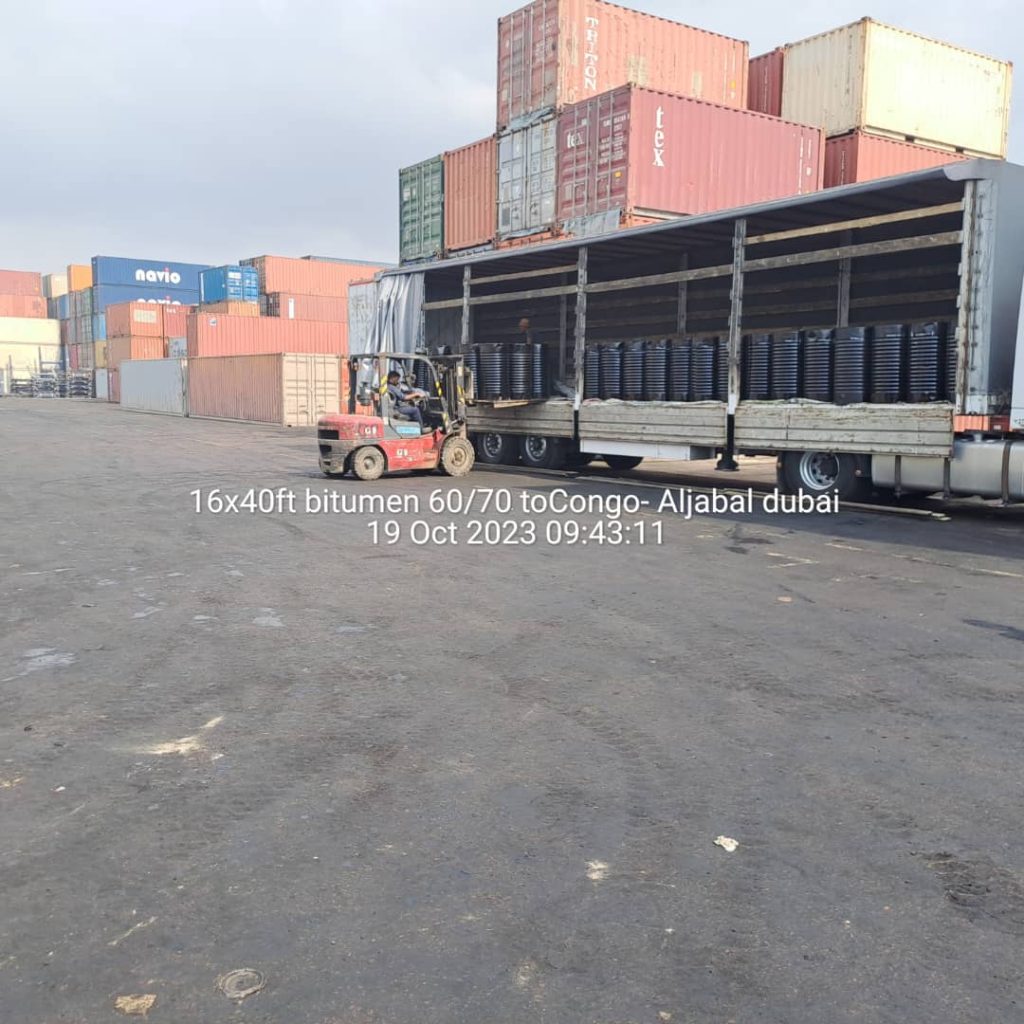
Introduction
In October 2023, AlJabal Holding took a significant leap in the international trade of road construction materials by exporting a substantial shipment of Bitumen 60/70 to Congo. The shipment comprised 16 containers, each measuring 40 feet, strategically dispatched to meet the rising demand for high-quality bitumen in the Central African nation. This development not only marks a pivotal milestone for the company but also highlights the increasing focus on infrastructural investments across Africa.
Bitumen 60/70, known for its reliable performance in road construction, is becoming a critical commodity in developing countries. It is used extensively in paving roads, waterproofing, and other construction applications. The durability and resistance properties of this grade make it an ideal choice for countries like Congo that are undergoing rapid infrastructure transformation.
This article explores the nuances of this export project, covering everything from the nature of Bitumen 60/70 and its significance to Congo’s development plans, to the logistical and strategic advantages that AlJabal Holding brings to the table.
About AlJabal Holding
AlJabal Holding is not just another name in the petroleum and bitumen trade—it’s a brand synonymous with trust, reliability, and excellence in exports. With its roots deeply embedded in the oil and gas industry, AlJabal has carved a reputation for being one of the most efficient and quality-conscious exporters of bitumen and other petroleum derivatives.
Headquartered in the Middle East, the company operates on a global scale, offering a wide range of petroleum-based solutions tailored to meet the infrastructural needs of its clients across Asia, Africa, and beyond. Over the years, AlJabal Holding has emerged as a key player in the supply chain, known for adhering to international quality standards, timely deliveries, and transparent business practices.
Their focus on innovation, client satisfaction, and sustainable business operations has positioned them as a preferred supplier for numerous government projects, road contractors, and construction firms. The October 2023 export to Congo is a testament to AlJabal’s strategic vision of tapping into emerging markets with enormous potential for growth, particularly in the African continent.
This successful transaction reinforces their commitment to supporting global infrastructure development, especially in regions where access to quality construction materials can significantly influence the pace and quality of economic progress.
Penetration Grade Explained
Let’s break it down: The “60/70” in Bitumen 60/70 refers to its penetration value. This value is determined by testing how deep a standard needle can penetrate the bitumen when a fixed force is applied at 25°C. A penetration depth of 60 to 70 tenths of a millimeter indicates that the bitumen is relatively hard, yet flexible enough to be workable under typical road construction conditions.
Why does this matter? Because the penetration grade directly impacts how the material behaves under traffic stress, heat, and environmental conditions. A softer grade might deform more quickly under heat, while a harder one could crack in colder climates. Bitumen 60/70 strikes a balance—it is not too hard to crack and not too soft to rut.
This makes it particularly suitable for tropical climates like that of Congo, where high temperatures and heavy rainfall are common. Roads constructed using Bitumen 60/70 tend to last longer, require less maintenance, and perform well even with increasing vehicular load. That’s precisely why AlJabal Holding chose this grade for their Congo export.
The Growing Demand for Bitumen in Africa
Africa’s infrastructure boom has led to a sharp rise in the demand for high-quality construction materials—and bitumen is at the heart of it. Across the continent, governments are racing to upgrade their roads, bridges, airports, and transport systems, driven by rapid urbanization and economic growth. In this massive transformation, bitumen plays a pivotal role, especially in paving durable roads and highways.
Over the last decade, the African Union and several regional economic communities have emphasized the need for transcontinental road connectivity. This initiative requires massive amounts of bitumen to construct reliable, all-weather roads that can withstand both heavy loads and diverse climatic conditions. From rural road upgrades to megaprojects connecting trade routes between countries, the volume of bitumen needed is staggering.
But there’s a challenge: much of Africa lacks domestic production capacity for quality bitumen. This gap presents a golden opportunity for international exporters like AlJabal Holding, who can provide not just the raw material but also assurance of quality, consistency, and timely delivery. Bitumen 60/70, in particular, is in high demand due to its performance in tropical climates, where it can resist both heat-induced rutting and water-induced stripping.
Global suppliers are increasingly eyeing Africa as the next big market for construction materials. The continent’s young population, booming urban centers, and international infrastructure funding make it a prime destination for bitumen exports. Countries like Nigeria, Kenya, Ethiopia, and Congo are leading the charge in road development, with bitumen requirements forecast to grow significantly in the coming years.
In this evolving landscape, AlJabal Holding’s decision to export bitumen to Congo in October 2023 is not only timely but also strategically sound. The demand is real, the growth trajectory is strong, and the need for trustworthy suppliers is critical.
Focus on Congo
Congo, also known as the Democratic Republic of the Congo (DRC), is a country on the rise. Despite decades of political instability, the nation is experiencing a developmental resurgence—particularly in infrastructure. From the capital Kinshasa to the mineral-rich provinces, the demand for better road networks, reliable transport systems, and urban planning is surging.
Road construction is a key government priority. With vast stretches of the country still underdeveloped, Congo is investing heavily in national and regional connectivity. Better roads mean improved access to healthcare, education, markets, and resource-rich areas that fuel the economy. But quality road construction demands reliable materials—hence the growing import of Bitumen 60/70.
The geographical and climatic challenges in Congo make it essential to use a high-performance grade like Bitumen 60/70. The country has high rainfall, tropical temperatures, and rugged terrain—all of which test the resilience of road surfaces. Bitumen that cannot withstand such conditions leads to potholes, cracking, and frequent repairs. That’s why 60/70 has become the preferred grade among road developers and engineers in Congo.
Congo’s bitumen demand is also influenced by mining operations and industrial growth. Major mining regions rely on transport infrastructure to move minerals to ports and export zones. Every additional kilometer of road paves the way for better economic returns. And it all starts with high-grade bitumen.
AlJabal Holding’s October 2023 export of 16×40 ft containers of Bitumen 60/70 was a direct response to this demand. The shipment not only filled an urgent infrastructure need but also established a strong foothold for AlJabal in the Congolese construction market. It’s a move that promises long-term benefits for both the company and Congo’s national development goals.
Why AlJabal Holding Chose Congo for Export
Strategically, Congo makes perfect sense for companies aiming to expand in Africa’s infrastructure sector. It is resource-rich, centrally located, and currently undergoing one of the most significant infrastructure overhauls in the region. For AlJabal Holding, this was more than just a sales opportunity—it was a chance to contribute to transformative change while tapping into a growing market.
One of the biggest reasons for targeting Congo is its untapped infrastructure potential. Many areas remain underdeveloped, and the government’s commitment to modernizing transport systems means consistent demand for construction materials over the next decade. In fact, Congo’s National Development Plan includes billions in funding for roads and bridges, with a significant portion allocated for bitumen procurement.
Another important factor is the lack of local production. While some neighboring countries have limited bitumen refining capacity, Congo is still largely dependent on imports for its road construction needs. This creates a reliable demand base for exporters like AlJabal Holding, who can offer steady supply chains and consistent quality.
Furthermore, Congo’s trade policies are becoming more favorable to foreign suppliers. With streamlined customs procedures, regional trade partnerships, and investment in port infrastructure, importing bitumen has become less bureaucratic than before. This gave AlJabal Holding a green signal to move forward with the October 2023 export.
The company also conducted detailed market research before finalizing the shipment. From engaging with local contractors and government agencies to assessing infrastructure gaps, AlJabal’s team ensured that this export aligned with real, on-ground needs.
Ultimately, this wasn’t just about sending 16 containers of bitumen—it was about creating impact. By stepping into the Congolese market, AlJabal Holding is positioning itself as a long-term partner in the country’s infrastructure development.
Details of the Shipment
The October 2023 export by AlJabal Holding involved the delivery of 16×40 ft containers of Bitumen 60/70—a sizable consignment meant to support multiple large-scale road projects across Congo. Each container was carefully packed, labeled, and documented to meet international shipping standards and ensure a smooth transit from port to destination.
These containers carried bulk bitumen in steel drums, designed to withstand long-distance travel, temperature fluctuations, and handling at various checkpoints. Each 40 ft container held approximately 110–120 drums, totaling over 1,700 drums for the entire shipment. That’s more than enough to pave several kilometers of road, which speaks to the scale and ambition of the construction projects involved.
This shipment was more than just logistics—it was a symbol of quality and trust. AlJabal Holding ensured that each drum met international penetration standards, had the correct labeling, and was sealed to prevent contamination or leakage during transit. Quality control checks were conducted at the point of origin, and additional inspection was done before loading onto the vessel.
The bitumen was dispatched via a well-established trade route, beginning from a major port in the Middle East and ending at Matadi Port, Congo’s primary maritime gateway. This port serves as the entry point for much of Congo’s imports and is strategically located to facilitate inland transport to Kinshasa and other construction hubs.
Logistics and Transport Details
Shipping bitumen is a sensitive process—especially when it involves cross-continental logistics. AlJabal Holding worked closely with maritime carriers, freight forwarders, and port authorities to ensure the cargo was handled professionally at every stage.
The shipping process included:
- Pre-shipment inspection to verify cargo readiness.
- Customs clearance and export documentation at the departure port.
- Sea freight using climate-resilient containers and anti-corrosion drums.
- Transit insurance covering damage or delays during shipment.
- Arrival protocols at Matadi Port, including customs clearance and port handling.
Upon arrival, AlJabal’s local partners facilitated inland transportation to various project sites across Congo. Dedicated trucks transported the drums safely, with real-time tracking enabled through GPS systems. Every step was meticulously planned to avoid delays and meet client deadlines.
This level of precision is what sets AlJabal Holding apart—ensuring that even a massive operation like exporting 16×40 ft containers of bitumen is executed with military-grade efficiency.
Bitumen Packaging and Quality Control
When it comes to exporting bitumen, especially over long distances to destinations like Congo, packaging and quality control are absolutely critical. AlJabal Holding understands this better than most and has invested in world-class systems to ensure that every shipment not only arrives intact but also meets international standards for performance and reliability.
For the October 2023 export of 16×40 ft containers, the bitumen 60/70 was packed in new steel drums, each weighing approximately 180–200 kg. These drums were specially coated inside and out to prevent rusting or chemical reactions that might compromise the integrity of the bitumen. Steel drums are the preferred method for bitumen packaging when the delivery involves complex transportation routes, extreme weather, or extended transit times—as is often the case in African trade corridors.
Before the drums were filled, every batch of bitumen underwent a rigorous testing process. AlJabal’s in-house quality control team used advanced lab equipment to check for penetration grade, softening point, ductility, flashpoint, and solubility—key parameters that determine how the bitumen performs under real-world conditions. Only after passing these tests was the bitumen cleared for packaging.
Each drum was then labeled with a batch number, penetration grade, net weight, gross weight, country of origin, and the export date. These markings ensure full traceability and accountability, which is essential in the export business. Moreover, third-party inspection agencies like SGS or Intertek were also brought in to certify the quality independently—giving customers in Congo added assurance.
Quality control didn’t stop at the factory. Upon arrival at Matadi Port in Congo, random samples were taken and retested by local engineers before the bitumen was accepted. This two-step verification process is what gives AlJabal Holding its reputation for trust and reliability. Clients know they’re getting exactly what was promised—no deviations, no shortcuts.
This level of precision, from drum design to dual quality checks, reflects AlJabal Holding’s deep commitment to not just delivering bitumen—but delivering confidence.
Regulatory Compliance and Export Documentation
In the global trade of petroleum products like bitumen, navigating the regulatory maze is a task that requires expertise, diligence, and experience. AlJabal Holding has mastered this aspect, ensuring that every export operation complies with international trade laws, customs regulations, and environmental policies.
For the October 2023 export to Congo, the company meticulously followed all legal protocols, both from the point of origin and at the destination. This involved coordinating with customs officials, obtaining export licenses, and ensuring all declarations were in place. Bitumen being a petroleum derivative, is classified under controlled goods in many countries, and this means additional scrutiny and documentation.
Key documents included:
- Certificate of Origin issued by the Chamber of Commerce.
- Bill of Lading (B/L) listing the shipping line, destination, and contents.
- Material Safety Data Sheet (MSDS) providing technical and safety info about Bitumen 60/70.
- Packing List detailing each container’s contents, number of drums, and total weight.
- Third-party Quality Inspection Certificate from agencies like SGS.
- Commercial Invoice for customs valuation.
- Export Permit or License granted by the relevant petroleum authorities.
AlJabal Holding also maintained full compliance with the International Maritime Dangerous Goods (IMDG) Code. While bitumen itself isn’t highly flammable in solid form, its shipping still requires adherence to handling and labeling norms to ensure safe transit.
On the Congo side, the import process was just as streamlined. AlJabal’s local logistics partners handled document submissions to the General Directorate of Customs and Excise (DGDA), ensuring that the shipment was cleared quickly and efficiently upon arrival at Matadi Port.
By maintaining a paper trail that was both complete and transparent, AlJabal avoided delays, fines, and any legal ambiguities. The company’s proactive approach to documentation and compliance is one of the reasons it is trusted by international buyers and government procurement officers alike.
Environmental Considerations
As industries evolve, sustainability is no longer optional—it’s essential. AlJabal Holding understands the environmental impact of bitumen production, handling, and export, and has implemented eco-conscious practices to reduce its carbon footprint.
Bitumen, being a petroleum byproduct, requires special care during handling and transport. Spills, improper storage, or waste disposal can harm ecosystems. That’s why AlJabal Holding takes a green approach to its operations, especially when exporting to environmentally sensitive regions like Africa.
First, the company uses recyclable steel drums for packaging. These drums can be reused or melted down after use, reducing waste at the destination. Local contractors in Congo were also encouraged to adopt responsible drum disposal practices, supported by awareness materials provided with the shipment.
Second, during loading and unloading, AlJabal strictly follows the ISO 14001 Environmental Management Standard, minimizing emissions and ensuring spill containment procedures are in place. Dedicated loading zones, closed piping systems, and regular equipment maintenance are some of the measures that ensure safety.
Additionally, the vessels used for shipping bitumen are IMO-compliant, meaning they adhere to international standards that reduce air and sea pollution. These ships use low-sulfur fuel, optimized engines, and are monitored for emissions during transit.
AlJabal Holding also offsets part of its carbon emissions through a partnership with reforestation and carbon-credit programs in Africa. For every major shipment, the company contributes to local environmental initiatives, such as tree planting and community-led sustainability workshops.
This balance of commerce and care is rare in the industry. By exporting responsibly and thinking long-term, AlJabal isn’t just selling bitumen—it’s building roads to a greener future.
Challenges Faced During Export
No international trade operation comes without its fair share of hurdles, and the October 2023 export to Congo was no exception. From bureaucratic red tape to logistical complexities, AlJabal Holding encountered—and overcame—multiple challenges that would have delayed or derailed less experienced exporters.
One of the biggest obstacles was port congestion. Matadi Port, being the main gateway for imports into Congo, often experiences delays due to high cargo volume, limited dock space, and inadequate unloading infrastructure. To navigate this, AlJabal’s logistics team pre-booked unloading slots, coordinated with port authorities in advance, and used inland haulage companies with proven reliability.
Another challenge was related to weather conditions. October is part of Congo’s rainy season, which complicates overland transportation and can damage improperly stored materials. AlJabal anticipated this by using fully sealed, water-resistant drums and ensuring that local storage facilities were equipped with covered spaces and drainage systems.
Customs clearance delays were also anticipated. Despite efforts to streamline the process, documentation errors or policy changes can often hold up cargo. AlJabal mitigated this risk by employing experienced clearing agents in Congo and maintaining real-time communication between the port, customs officials, and their own dispatch team.
There was also the challenge of currency fluctuations and payment terms. Since trade with Congo involves local banking institutions and currency conversions, managing forex risks became a key priority. AlJabal worked with international banks to secure letters of credit (LCs), thus protecting both themselves and the buyer from financial exposure.
Despite these challenges, AlJabal Holding delivered the entire shipment on time, without a single customer complaint or cargo rejection. That speaks volumes about their planning, professionalism, and commitment to excellence—even in the face of adversity.
Competitive Advantage of AlJabal Holding
In a market where multiple players are vying for dominance, AlJabal Holding stands out—not just for its products, but for the holistic value it brings to the table. The successful October 2023 export to Congo is a textbook example of how strategic thinking, operational excellence, and customer-centricity combine to create a competitive edge.
First and foremost, quality assurance is AlJabal’s strongest pillar. While many suppliers cut corners or rely on inconsistent refining processes, AlJabal sources its bitumen from certified refineries and backs every batch with lab-tested results. This level of reliability gives contractors peace of mind and reduces risk on government-funded infrastructure projects.
Then comes logistics expertise. Exporting bitumen is not like shipping ordinary goods—it requires climate-sensitive containers, accurate documentation, customs compliance, and coordination across multiple jurisdictions. AlJabal has a dedicated export division that specializes in navigating these complexities, allowing them to deliver faster, safer, and more efficiently than most competitors.
Their customer service approach is another major differentiator. Instead of simply acting as a seller, AlJabal builds long-term relationships with clients. This involves market analysis, demand forecasting, post-shipment support, and sometimes even technical training on handling and application. Their proactive engagement turns one-time buyers into repeat customers.
Also worth noting is their flexibility and scalability. Whether the order is 5 containers or 50, AlJabal Holding can deliver with the same level of precision. They maintain reserves of ready-to-ship inventory and collaborate with multiple freight carriers to avoid bottlenecks and delays.
Finally, AlJabal’s reputation in the international market gives them an added edge. Their name carries weight not just in the Middle East but across Africa, Asia, and Europe. In an industry built on trust and performance, that brand recognition is invaluable.
Together, these factors make AlJabal Holding not just a supplier—but a strategic partner in Africa’s infrastructure revolution.
Future Outlook
With the success of the October 2023 bitumen export to Congo, AlJabal Holding is setting its sights even higher. The company plans to expand its footprint across Central and East Africa, tapping into booming construction sectors in countries like Uganda, Rwanda, Tanzania, and Angola.
In Congo, the groundwork is already being laid for multi-year supply agreements. AlJabal is in discussions with several government ministries and large private contractors to become a preferred supplier of not just Bitumen 60/70, but also other grades like 80/100 and polymer-modified bitumen (PMB). These materials are in demand for highways, airports, and industrial roads—projects that form the backbone of national infrastructure.
There are also plans to establish a regional logistics hub near the Port of Matadi. This facility would enable faster distribution, better inventory management, and even allow for local repackaging or blending—bringing even more value to the Congolese market.
AlJabal is also exploring opportunities in eco-friendly bitumen and cold mix technology, which can reduce environmental impact and enable road construction even during the rainy season. By staying ahead of global trends and local needs, the company aims to not just keep up—but lead the bitumen supply chain evolution in Africa.
Additionally, digital transformation is on the horizon. AlJabal Holding is working on launching a customer portal where clients can track shipments, request quotes, download MSDS files, and even get technical advice. This tech-forward approach will further strengthen customer relationships and streamline operations.
The future is bright—and AlJabal Holding is ready to pave the way, one container of bitumen at a time.
Conclusion
The 16×40 ft Bitumen 60/70 export by AlJabal Holding to Congo in October 2023 wasn’t just another business transaction—it was a statement. A statement about quality, commitment, and vision. In a market where delays, quality issues, and broken promises are common, AlJabal delivered excellence on every front.
This export project not only fulfilled an immediate need in Congo’s infrastructure sector but also set the foundation for long-term partnerships, market expansion, and technological advancement in the bitumen trade.
From selecting the right penetration grade to mastering logistics, ensuring compliance, and putting sustainability front and center—AlJabal Holding showcased what it truly means to be a global leader in petroleum exports. As Africa continues to rise, so will the need for trusted suppliers, and with their proven track record, AlJabal is more than ready.
FAQs
1. What is the grade 60/70 in bitumen?
Bitumen 60/70 refers to its penetration grade. The numbers indicate how far a needle penetrates the material under specific conditions. A 60/70 grade means moderate hardness, suitable for tropical climates and heavy traffic conditions—perfect for roads in countries like Congo.
2. Why is bitumen used for roads?
Bitumen is waterproof, adhesive, and flexible. It binds aggregates in asphalt, creating smooth, durable road surfaces that can handle stress, weather, and traffic over time.
3. Is AlJabal Holding a certified exporter?
Yes, AlJabal Holding is fully certified, working with international bodies like SGS and adhering to ISO and IMDG standards for quality, safety, and environmental compliance.
4. How does Congo benefit from bitumen imports?
Imports like Bitumen 60/70 support Congo’s infrastructure development, enabling better roads, job creation, and improved connectivity across the country.
5. What are the quality standards for bitumen exports?
Bitumen exports must meet standards for penetration, softening point, flashpoint, ductility, and solubility. Certifications from third-party labs ensure compliance and performance.

